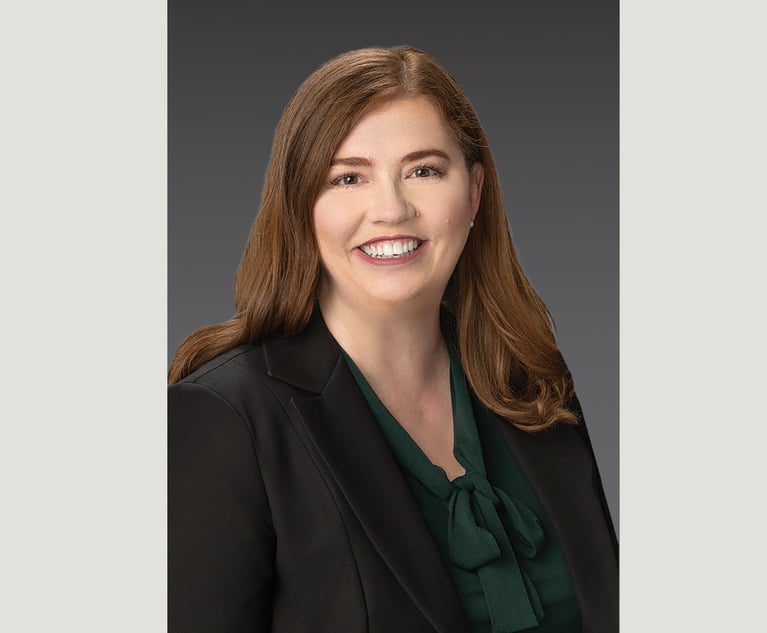Cybersecurity Insurers Are Dropping Some Law Firms: The Morning Minute
The news and analysis you need to start your day.
November 19, 2021 at 06:00 AM
5 minute read

Want to get this daily news briefing by email? Here's the sign-up.
WHAT WE'RE WATCHING
ROUGH JUSTICE - The U.S. Department of Justice appears to no longer be fooling around. As Law.com's Nate Robson writes in this week's Law.com Barometer newsletter, the DOJ is making critical policy changes for white-collar enforcement, including reinstating the so-called "Yates Memo" from 2015. These newly instituted policies require companies seeking cooperation credit to divulge all relevant facts about individuals involved in any misconduct, and the DOJ is taking a holistic approach when looking at companies' prior misconduct when deciding on potential charges or dispositions. "The private sector is waiting to see how these new rules are implemented, and is watching to see if the policies disincentivize them from self-reporting violations out of fear of facing additional sanctions if DOJ has issues with a company's history of compliance," Robson writes. "The private sector is beefing up its compliance programs, including adding staff and ensuring they are doing comprehensive risk assessments that mirror what the government is focusing on." To receive the Law.com Barometer directly to your inbox each week, click here.
ARE YOU IN GOOD HANDS? - Go ask the plaintiffs in COVID-19 business interruption cases what happens when worse literally comes to worst: insurance coverage becomes more essential to have and way harder to get. And, with all due respect to the coronavirus, risks don't get much riskier than cybersecurity. As Law.com's Victoria Hudgins reports, small law firms are facing insurance carriers that are placing a heavier emphasis on proactive cybersecurity measures, dropping clients, and even exiting the cyber insurance space when the risk outweighs the premium. In the last eight months, insurers have increasingly dropped policyholders that don't have multifactor authentication in place, which typically includes small law firm clients, noted Amy Landefeld, cyber product lead and digital underwriting manager at insurance provider Beazley. But its not all the firms' fault. The past approximately two years of increased ransomware attacks has taught insurers an expensive lesson regarding cyber insurance, noted Kevin Novak, cybersecurity managing director of information governance and data risk management provider Breakwater Solutions. "It's a result, not necessarily because of [small law firms], but the insurance firms are beginning to readjust, better understand what the market is relative to cyber breaches," Novak said. "They're starting to recognize they can't carry the same policies for everyone. It's becoming a big problem in the market."
ARBITRATION LIMITATION - IBM was sued Thursday in New York Southern District Court over a provision in its arbitration agreement that tightly limits the time window for plaintiffs to pursue discrimination claims. The lawsuit was brought by Lichten & Liss-Riordan on behalf of Sharon Gilmore, a former IBM employee who contends that she was pushed out as part of a campaign to replace older workers. The suit is part of a string of filings related to an arbitration provision that bars claimants from extending the statute of limitations for discrimination claims by 'piggybacking' on earlier filings. Counsel have not yet appeared for the defendant. The case is 1:21-cv-09574, Gilmore v. International Business Machines Corp. Stay up on the latest deals and litigation with the new Law.com Radar.
EDITOR'S PICKS
- Complacent Law Firms Lose Points With Clients By Dan Packel
WHILE YOU WERE SLEEPING
DO NOT DISTURB - As Law.com International's Anne Bagamery reports, new proposed legislation in Portugal would widen protections for remote workers, including expanded coverage for expenses incurred and greater flexibility for workers with small children who want to work from home. The new law, if enacted, would also enshrine the "right to disconnect" for remote workers, prohibiting employers from requiring employees to respond to messages or phone calls outside of agreed-upon business hours—similar to a French law enacted several years ago. "The law is evolving along with the work landscape," said Rui Valente, a partner and head of the employment law practice in Portugal for the Spanish firm Garrigues. "The home office will, from this moment on, be with us forever." However, the extent of the proposed law's potential impact on lawyers themselves remains unclear, as so many of them are classified in Portugal as independent contractors rather than employees.
This content has been archived. It is available through our partners, LexisNexis® and Bloomberg Law.
To view this content, please continue to their sites.
Not a Lexis Subscriber?
Subscribe Now
Not a Bloomberg Law Subscriber?
Subscribe Now
NOT FOR REPRINT
© 2025 ALM Global, LLC, All Rights Reserved. Request academic re-use from www.copyright.com. All other uses, submit a request to [email protected]. For more information visit Asset & Logo Licensing.
You Might Like
View All
FTC's Info Security Action Against GoDaddy Sends 'Clear Signal' to Web Hosting Industry: Expert


Avoiding Legal Risks: Crafting a Strong Do Not Call Policy for Compliance
7 minute read
'Be Prepared and Practice': Paul Hastings' Michelle Reed Breaks Down Firm's First SEC Cybersecurity Incident Disclosure Report
Law Firms Mentioned
Trending Stories
- 1States Accuse Trump of Thwarting Court's Funding Restoration Order
- 2Microsoft Becomes Latest Tech Company to Face Claims of Stealing Marketing Commissions From Influencers
- 3Coral Gables Attorney Busted for Stalking Lawyer
- 4Trump's DOJ Delays Releasing Jan. 6 FBI Agents List Under Consent Order
- 5Securities Report Says That 2024 Settlements Passed a Total of $5.2B
Who Got The Work
J. Brugh Lower of Gibbons has entered an appearance for industrial equipment supplier Devco Corporation in a pending trademark infringement lawsuit. The suit, accusing the defendant of selling knock-off Graco products, was filed Dec. 18 in New Jersey District Court by Rivkin Radler on behalf of Graco Inc. and Graco Minnesota. The case, assigned to U.S. District Judge Zahid N. Quraishi, is 3:24-cv-11294, Graco Inc. et al v. Devco Corporation.
Who Got The Work
Rebecca Maller-Stein and Kent A. Yalowitz of Arnold & Porter Kaye Scholer have entered their appearances for Hanaco Venture Capital and its executives, Lior Prosor and David Frankel, in a pending securities lawsuit. The action, filed on Dec. 24 in New York Southern District Court by Zell, Aron & Co. on behalf of Goldeneye Advisors, accuses the defendants of negligently and fraudulently managing the plaintiff's $1 million investment. The case, assigned to U.S. District Judge Vernon S. Broderick, is 1:24-cv-09918, Goldeneye Advisors, LLC v. Hanaco Venture Capital, Ltd. et al.
Who Got The Work
Attorneys from A&O Shearman has stepped in as defense counsel for Toronto-Dominion Bank and other defendants in a pending securities class action. The suit, filed Dec. 11 in New York Southern District Court by Bleichmar Fonti & Auld, accuses the defendants of concealing the bank's 'pervasive' deficiencies in regards to its compliance with the Bank Secrecy Act and the quality of its anti-money laundering controls. The case, assigned to U.S. District Judge Arun Subramanian, is 1:24-cv-09445, Gonzalez v. The Toronto-Dominion Bank et al.
Who Got The Work
Crown Castle International, a Pennsylvania company providing shared communications infrastructure, has turned to Luke D. Wolf of Gordon Rees Scully Mansukhani to fend off a pending breach-of-contract lawsuit. The court action, filed Nov. 25 in Michigan Eastern District Court by Hooper Hathaway PC on behalf of The Town Residences LLC, accuses Crown Castle of failing to transfer approximately $30,000 in utility payments from T-Mobile in breach of a roof-top lease and assignment agreement. The case, assigned to U.S. District Judge Susan K. Declercq, is 2:24-cv-13131, The Town Residences LLC v. T-Mobile US, Inc. et al.
Who Got The Work
Wilfred P. Coronato and Daniel M. Schwartz of McCarter & English have stepped in as defense counsel to Electrolux Home Products Inc. in a pending product liability lawsuit. The court action, filed Nov. 26 in New York Eastern District Court by Poulos Lopiccolo PC and Nagel Rice LLP on behalf of David Stern, alleges that the defendant's refrigerators’ drawers and shelving repeatedly break and fall apart within months after purchase. The case, assigned to U.S. District Judge Joan M. Azrack, is 2:24-cv-08204, Stern v. Electrolux Home Products, Inc.
Featured Firms
Law Offices of Gary Martin Hays & Associates, P.C.
(470) 294-1674
Law Offices of Mark E. Salomone
(857) 444-6468
Smith & Hassler
(713) 739-1250








